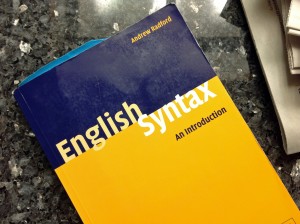Present Tense Narration
Having established the three categories of Point of View—first-, second-, and third-person—we move on to types of narration. These are variables that can occur within… Read More »Present Tense Narration
Having established the three categories of Point of View—first-, second-, and third-person—we move on to types of narration. These are variables that can occur within… Read More »Present Tense Narration
We complete the barrier object series with our final entry: hedges and qualifiers. These rhetorical tidbits come in many forms. The terms “hedge” and “qualifier”… Read More »Hedges and Qualifiers | Liar, Liar
Our barrier object series continues with expanded verb structures. These come in a variety of forms. A Rundown of Verb Features In the simplest of… Read More »Expanded Verb Structures | Liar, Liar
The next offender in our sequence of barrier objects is a big one: filter verbs. Filter Verbs Defined She felt the cold November wind wafting… Read More »Filter Verbs | Liar, Liar
Continuing in our series of literary barrier objects, we delve into the boondoggle of excessive, expressive dialogue tags. The Basics A dialogue tag, as its… Read More »Excessive Expressive Dialogue Tags | Liar, Liar
Nestled among the marked (or “dispreferred”) behaviors of discourse we find a lovely little linguistic feature known as “hedging.” Hedging is the default refuge of… Read More »Hedging with Modals and Modifiers
If English language elements are a collection of family members, the Subjunctive Mood is the sickly great-uncle, bed-ridden and lingering at death’s door for… Read More »If I Were Any More Uncertain, I’d Be Subjunctive
Objectives:
Skill level: Advanced
As indicated by the title, this is the final post in my verb series, though not necessarily my final post on verbs. (Who knows what the future holds, yeah?) This is mostly an overview post, so it’s short, quick, and to the point.
This post covers two essential constructs most commonly associated with the verb to be.
Objectives:
Skill Level: Intermediate
In English, the term “copula” (or “linking verb”) refers to a verb that links a subject and a subject predicate. (The subject predicate, as indicated by its name, takes a nominative case.) The copula serves as a sort of grammatical placeholder and holds little lexical meaning despite its grammatical and rhetorical purpose.

The discussion in this post requires a different view of language structure. For a deeper understanding, I refer you to Andrew Radford’s English Syntax: An Introduction (ISBN 0521542758), particularly pp. 190-193 . Much of this post draws from that source.
Objectives:
Skill level: Advanced
Read More »Verbs, Part 4: Theta-Roles, or How to Eliminate Passive Voice